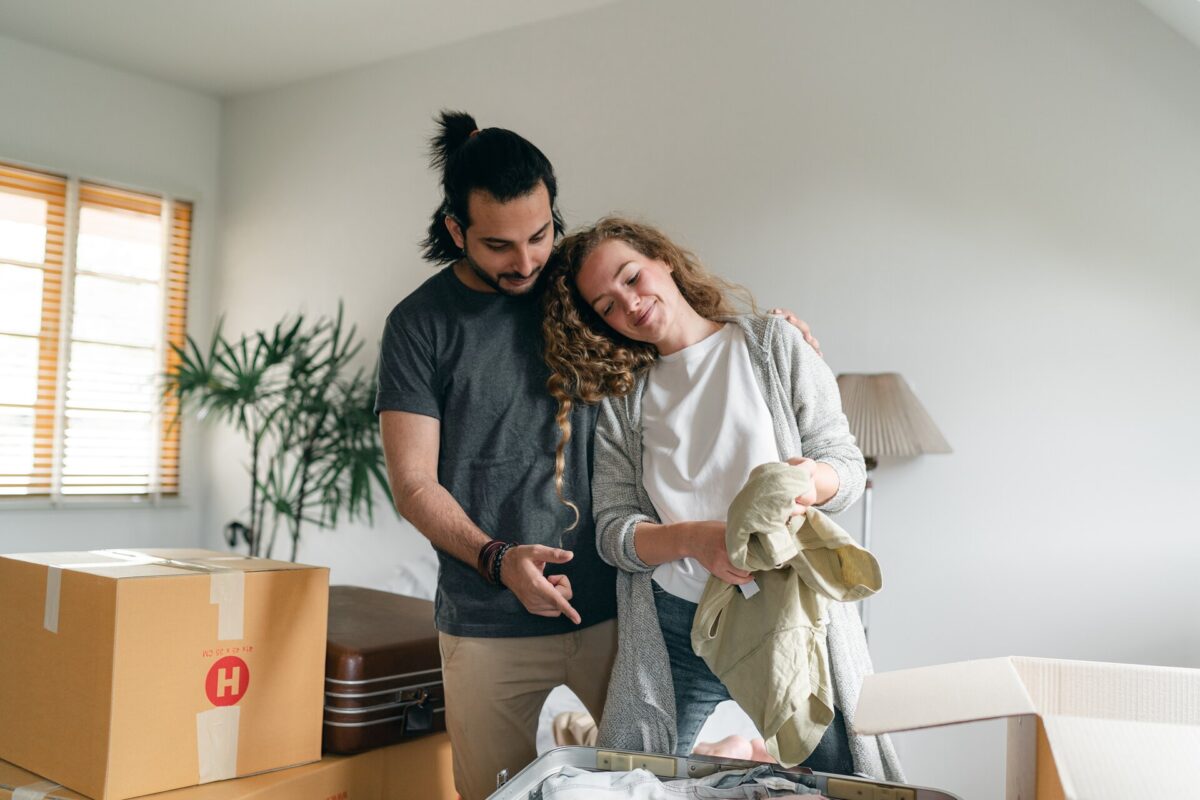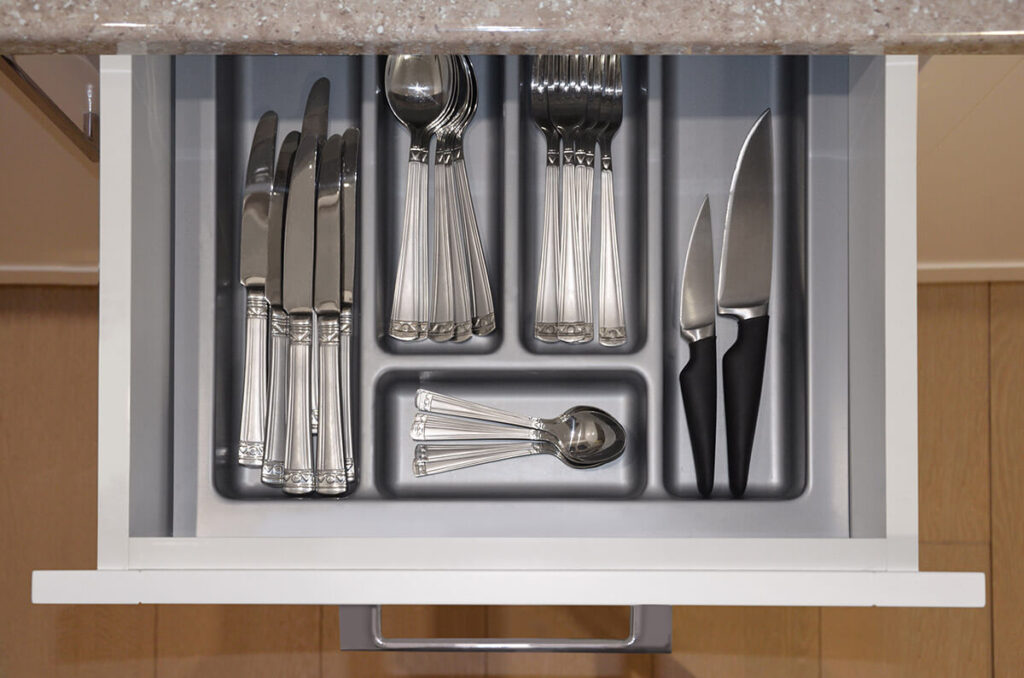If you’ll be moving to a smaller home overseas, you’re in the right place. Relocating to a different country can be an exciting and transformative experience, but downsizing to a smaller living space adds an extra layer of complexity. Fear not, for we are here to guide you through this process and make your transition as effortless as possible.


Moving to a Smaller House Means Downsizing – Are You Ready for That?
So, you’re contemplating a move to a smaller house, eh? Downsizing and moving to a small home – it doesn’t sound very fun, but are you ready to take on this epic challenge? Picture this: a moving checklist longer than a Tolkien novel, the thrill of moving abroad, and the quest to relocate to a new home that’s cozy, compact, and oh-so-charming.
But why, you may ask, would anyone willingly choose to downsize? Well, there are plenty of reasons! Maybe you crave a simplified existence, free from the clutter of material possessions. Or perhaps you’re an adventurer at heart, yearning to explore new horizons without being weighed down by excess baggage.
Whatever your reasons, understanding the advantages and challenges of downsizing is crucial. Ready for this grand adventure? Let’s dive into the world of downsizing and unlock the secrets to living large in a smaller space.


The Pros and Cons of Moving to a Smaller Home
A smaller home means less maintenance, fewer expenses, and a cozy nest that exudes charm. You’ll have more time to pursue passions, travel, or simply relax. Also, if you’re relocating on a tight budget, having fewer items for shipping will cost you less. However, fair warning, there are a few cons to consider.
Say goodbye to impromptu dance parties or hosting large family gatherings. Storage space can be a puzzle, testing your Tetris skills. And if you’re an avid collector of curiosities, they might have to bid adieu or find new nooks to call home. But fear not! With clever organization, creative solutions, and a sprinkle of ingenuity, the cons can become mere blips on the radar.
The Positive Sides
With less square footage to clean and maintain, you’ll find yourself with extra time on your hands — time for the things you love and the adventures you crave. And let’s not forget the sweet sound of lower utility costs and expenses. A smaller space means less energy consumption, resulting in savings that could fuel your wanderlust or satisfy your taste for the finer things in life.
Embrace the challenge of efficient space utilization as you unlock the secrets of creative storage ideas that transform nooks and crannies into functional wonders. After all, who needs a mansion when a cozy retreat can provide just as much solace?
So, settle into your new abode, our fellow downsizer, and revel in the joys of a simplified life. Remember, relocation essentials include more than just the physical act of relocating; they encompass the liberation that comes from embracing a smaller, yet immensely fulfilling living space.


The Negative Sides
While moving to a smaller home may hold its allure, there are a few challenges to keep in mind. Brace yourself for the hurdle of limited storage space, where each square inch becomes a valuable commodity. You may find yourself pondering over what to keep when relocating, forced to make tough decisions about sentimental items that hold memories close to your heart.
Adjusting to the living environment can also be a journey of adaptation. The cozy quarters might require some creative maneuvering and adjustments to your accustomed way of life. Additionally, if you’re moving to another country, there’s the added complexity of navigating a new culture and embracing unfamiliar surroundings.
But, embrace the art of letting go, and you’ll discover the freedom that comes with decluttering and simplifying your life. Remember, downsizing can also be a means to save money to move or to fund new adventures in the adopted country.
How to Start the Task of Moving From a Large Home to a Smaller
First and foremost, avoid common relocation mistakes by starting early and staying organized. Begin by creating a comprehensive to-do list that outlines the necessary steps, from sorting and decluttering to packing and arranging logistics. Assess all belongings with a discerning eye, determining what to keep, donate, or sell.
A smaller space calls for efficiency, so prioritize items that serve a purpose or hold sentimental value. As you pack, label boxes meticulously, making unpacking a breeze at your new abode. Don’t forget to notify utility companies, update your address, and arrange for any necessary services in your new location.
Create a Decluttering and Downsizing Plan
It is essential to begin by assessing each room or area separately. Start by categorizing items into keep, donate, sell, or discard piles, ensuring that you only retain belongings that truly add value or joy to your life.
Implement a systematic approach, packing efficiently by organizing items into clearly labeled boxes or containers based on their destination or purpose. Streamline your possessions by letting go of duplicates or items that no longer serve a purpose, and consider donating or selling them to others who may find them useful.
Lastly, make use of storage solutions and prioritize functionality when arranging your remaining belongings, ensuring that you maintain a clutter-free and organized living space.


Create Keep, Sell, Donate, and Discard Categories
How can you decide what needs to be sold and what is thrown away when relocating across the world? Well, we have a list of categories that can help you with this task. Here is our list:
Keep:
- Essential items for daily living,
- Sentimental items with deep personal meaning,
- Items that hold significant value and are difficult to replace.
Sell:
- Items that are still in good condition and can fetch a reasonable price,
- Furniture, appliances, or electronics that are no longer needed or suitable for the move,
- Collectibles or valuable items that can be sold to collectors or through online marketplaces.
Donate:
- Clothing, shoes, and accessories in good condition that you no longer wear or need,
- Household items like kitchenware, small appliances, or decor that are still usable,
- Books, toys, or games can be taken to local charities such as Goodwill and The Salvation Army.
Discard:
- Broken or irreparable items,
- Expired or spoiled food, medications, or personal care products,
- Worn-out or heavily damaged items with no practical or sentimental value.
Explore Creative Storage Solutions to Maximize Space Usage
Utilize vertical space by installing shelves or hanging organizers. Use under-bed storage containers or vacuum-sealed bags to store seasonal clothing or bedding.
Opt for furniture with built-in storage compartments, such as ottomans or coffee tables with hidden storage. Make use of wall-mounted hooks or pegboards for hanging items like keys or accessories. Utilize storage bins or baskets to categorize and contain smaller items.
Here is an excellent video with very useful tips on how to organize your home better and save space.
Planning an International Move to a Smaller House
When planning an international move to a smaller house, especially if it’s your first relocation, it’s crucial to approach the process with careful consideration and smart strategies. Begin by assessing your current belongings and categorizing them into essentials and non-essentials.
Pack efficiently, utilizing space-saving techniques like vacuum-sealed bags and compact storage containers. Prioritize versatile and multi-functional furniture to maximize space utilization.
Also, research local customs and regulations to ensure a smooth transition. Don’t forget to think about whether you’d be shipping a vehicle overseas and whether you’d need to hire an overseas shipping company.
Researching the Housing Market and Options in the New Country
When researching the housing market and exploring housing options in a new country, it’s important to conduct thorough research and gather relevant information, familiarizing yourself with the local real estate market trends, property prices, and neighborhoods.
Use online platforms, real estate agencies, and local resources to search for available properties. Consider factors such as proximity to amenities, transportation, and safety when evaluating different neighborhoods. Seek advice from locals or expatriate communities for valuable insights and house-hunting tips specific to the new country.


Engaging the Services of a Reputable International Moving Company
Engaging the services of a reputable international moving company is essential for ensuring an efficient and smooth relocation. These professionals possess the expertise and experience necessary to handle the challenges of an international move.
They understand the logistics involved, including customs regulations, documentation requirements, and transportation arrangements. By relying on their services, you can minimize the stress and hassle associated with moving internationally. A reputable overseas moving company will provide packing, shipping overseas, and delivery services, ensuring the safe and timely transport of your belongings.
Navigating Customs, Shipping Regulations, and Legal Considerations
International movers play a crucial role in navigating customs, shipping regulations, and legal considerations when relocating. They have an excellent understanding of the intricacies involved in international moves, including customs requirements, import/export regulations, and documentation procedures.
By hiring an international relocation company, you can benefit from their knowledge and experience in preparing the necessary paperwork. They can guide you through the entire process, handle customs clearance on your behalf, and provide advice on any legal considerations specific to your destination country.


How to Embrace Small Spaces and New Adventures
Embracing small spaces and new adventures can be an exciting and fulfilling journey. Incorporate multipurpose furniture that serves multiple functions, such as a sofa bed or a storage ottoman. This allows you to optimize space while maintaining practicality.
Cultivate a minimalist lifestyle by keeping only what truly brings joy and purpose to your life. Adopting a “less is more” mindset allows you to appreciate the beauty of simplicity and create a serene living environment.
When designing the layout of your smaller home, focus on stylish and efficient arrangements. Maximize natural light, use mirrors to create an illusion of space, and embrace vertical storage solutions.
Everything Is Possible With the Help of International Movers
Relocating to a smaller apartment or house is an opportunity for a fresh start and a more simplified lifestyle. With the help of international movers, such as Sunset International Shipping, the transition becomes even more efficient. Investing in our moving services ensures that your belongings are handled with care and transported safely to your new place, no matter the distance.
Additionally, considering our packing services can save you valuable time and effort, as experienced professionals will expertly pack and organize your belongings, thus helping you to optimize space in your smaller home. Contact us right away and you won’t regret it.
FAQ
Deciding if relocating to a smaller home overseas is the right choice for you requires careful consideration of your lifestyle, priorities, and goals. Evaluate factors such as cost of living, cultural differences, proximity to family and friends, and your ability to adapt to a smaller living space.
Downsizing can offer numerous advantages. It can lead to reduced living expenses, less maintenance, and a simpler lifestyle. It encourages a focus on what truly matters, promotes sustainability, and opens up opportunities for new experiences and adventures in a foreign country.
To begin the process of decluttering and downsizing before relocating overseas, start by assessing your belongings room by room. Categorize items into keep, donate, sell, or discard piles. Pack efficiently, label boxes clearly, and prioritize items that hold sentimental or practical value.
Practical tips for maximizing space and storage in a smaller home overseas include utilizing vertical space with shelves and hanging organizers, using under-bed storage containers, opting for multi-functional furniture with built-in storage, and categorizing and containing items with storage bins or baskets.
Finding a suitable smaller apartment or house overseas involves thorough research. Use online real estate platforms, local real estate agents, and expatriate communities for information and insights. Consider factors such as location, amenities, transportation options, and safety when evaluating different properties.
Adjusting to a smaller living environment in a foreign country requires flexibility and adaptability. Embrace the opportunity to simplify your lifestyle and focus on the positives of the new culture and surroundings. Be open to new ways of doing things and explore local traditions and customs.
Managing the emotional challenges of letting go of possessions when relocating to a smaller home overseas can be challenging. Focus on the benefits of decluttering, such as a lighter load and a fresh start. Keep sentimental items that truly hold deep meaning and find ways to cherish memories without physical possessions, such as through photographs or digital copies.
When downsizing and relocating to a smaller home overseas, it’s important to be aware of cultural and legal differences. Research local customs, regulations, and any restrictions on certain items or imports. Familiarize yourself with residency requirements, visa regulations, and property ownership laws to ensure a stress-free transition.
Strategies for creating a functional and comfortable living space in a smaller home overseas include maximizing natural light, using mirrors to create an illusion of space, and choosing furniture that is appropriately sized for the smaller space. Prioritize functionality and organization, and consider multifunctional pieces that serve multiple purposes.
To make the most of a smaller home overseas and embrace a minimalist lifestyle, focus on intentional living and surround yourself with items that serve a purpose. Simplify your possessions, declutter regularly, and prioritize experiences over material possessions. Embrace the freedom and flexibility that a minimalist lifestyle can offer.












